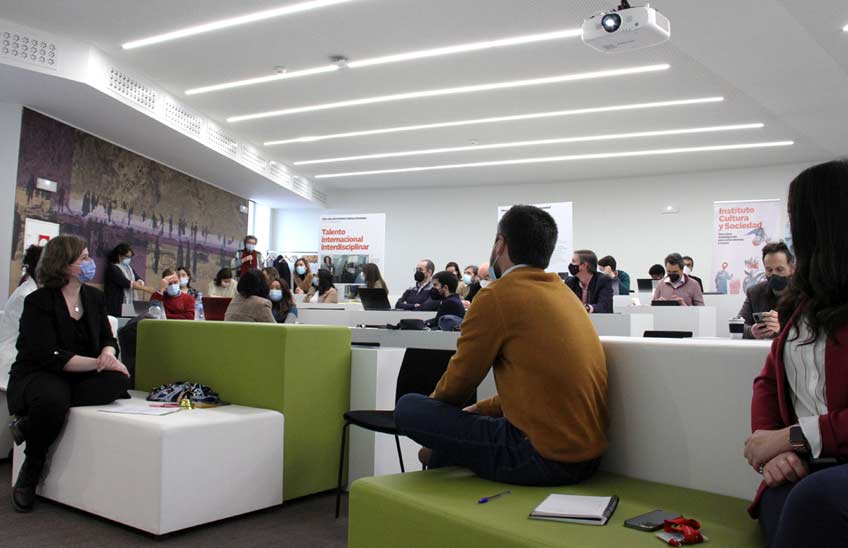20 ICS researchers present projects with high scientific and social impact at framework of the XI Annual meeting
It was held at degree scroll 'Intergroup Dialogue for a New Decade' and was coordinated by Inés Olza Moreno and Martiño Rodríguez-González.

FotoNatalia Rouzaut<br>/Investigadores del ICS durante el XI Encuentro Anual
07 | 12 | 2021
20 researchers from the Institute for Culture and Society (ICS) of the University of Navarra presented projects with high scientific and social impact at framework of the XI Annual meeting of the center. The event was held under the degree scroll 'Intergroup dialogue facing a new decade' and was coordinated by Inés Olza, from the group 'Emotional culture and identity', and Martiño Rodríguez-González, from 'Education of affectivity and human sexuality'.
These were the interventions of the 'research' block:
→ Javier García Manglano (Youth in transition) presented the network BienCOVID International, which analyzes the levels of well-being and discomfort generated by interaction with digital media during the pandemic. He explained the experience of a study conducted in confinement in which they surveyed more than 9,500 young people and about which they have already published several articles.
He also presented a partnership that group is conducting with Brigham Young University (USA) for the development of a model transition to adulthood and another ongoing line on young people's beliefs about marriage and life as a couple.
→ Ana Belen Martínez (Emotional culture and identity) spoke about her book New Forms of Self-Narration: Young Women, Life Writing and Human Rights (Palgrave Studies in Life Writing). In it she collects autobiographical testimonies of several young international activists in the field of human rights, who use different media (social networks, blog, interviews...) to launch their message to the world.
→ Dámaso Izquierdo (Public discourse) focused on a branch of Forensic Linguistics centered on defamation and hate speech . The goal is to seek clear linguistic criteria to establish the boundary between freedom of expression and the right to honor.
→ Alfonso Osorio (Education of affectivity and human sexuality) offered some advances of his projects on intimate partner violence, both in adults and adolescents. One of the most outstanding issues is the creation and validation of his own tool to measure this subject of violence taking into account all its dimensions (physical, sexual, psychological...), as well as associated variables and the influence of romantic love myths.
→ José Ignacio Murillo(Mind-brain) focused on the interdisciplinary study of human habits, which addresses issues related to identity, cognition, etc. to understand the action of the person. They analyze how Neuroscience and Philosophy approach the notion of habits. He also mentioned the partnership with the University Museum of Navarra to understand the artists' experience of how learning and habits are somewhat compatible.
→ Ana Marta González (Emotional culture and identity) presented the book Descubrir el nombre: subjetividad, identidad y socialidad, in which she delves into the relationship between subjectivity, identity and sociality to reflect broadly on what it is to be human. It covers important issues such as the weight of language in subjectivity, the dynamism of identity staff, the importance of self-knowledge, corporeality...
→ Jaume Aurell (Religion and Civil Society) spoke about one of the lines of the group, 'Political Theology', a concept related to the transfer between the political and religious spheres. The group pays special attention to narratives, which are grand narratives that polarize extremes and generate violence in public life. In order to approach them (secularization, postcolonialism...), the team considers that this concept is useful as a methodology to influence the academy and the public sphere.
→ Loris de Nardi (Creativity and Cultural Heritage) presented an international network between research centers for the comparative and interdisciplinary study of public policies for management disaster risk in Latin America. He argues that disasters are not natural, but social constructions, result of historical processes that lead a community to be vulnerable.
→ Luis Alberiko Gil-Alaña(Navarra Center for International Development) showed some examples of the applications of time series (data collected over time) in fields such as tourism, seismography, climate change... It uses fractional integration methods and looks for models that allow predicting future behavior of time series.
→ Eduardo Garralda(ATLANTES) presented the cooperation of a network wide range of teams for the project 'Mapping the development of palliative care', which presented the status of the development of this specialization program in 198 countries around the world. The main result of this research, led by the University of Glasgow, was the development of a world map, which has allowed synthesizing a large amount of information and presenting the data in an accessible way.
→ Gonzalo Arrondo(Mente-cerebro) spoke about his project 'ADHD: decisions, medication and lifestyles', which lasted four years. As he explained, it has had a formative impact for the group because it has allowed him to update on recent techniques and theories, as well as to work with international experts in the applied field and with students and professors from the School of Education and Psychology. In addition, it has led to the publication of several meta-analyses that have been very well received at academic community, as well as materials for knowledge dissemination.
